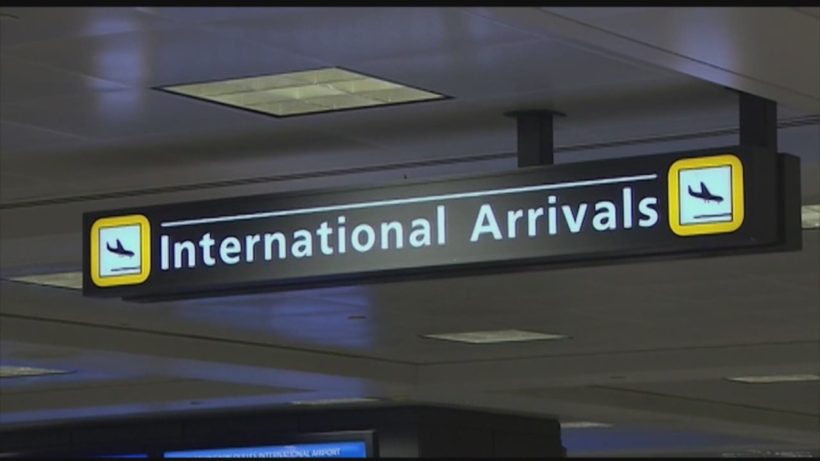
redo Jump to...
print Print...
(by Miriam Jordan, TheWall Street Journal) – In the aftermath of the terrorist attacks in California and Paris, the Obama administration on Thursday tightened a program that allows nationals of certain countries to travel to the U.S. without a visa by restricting entry for those who have dual citizenship in Iran, Iraq, Sudan or Syria. The Visa Waiver Program Improvement and Terrorist Travel Prevention Act of 2015, introduced by Rep. Candice Miller (R-MI), amends the Immigration and Nationality Act to provide enhanced security measures for the visa waiver program (VWP).
Under the program, nationals from 38 countries, primarily in Europe, may enter the U.S. for tourism or business without a visa. Nationals of these countries who also are citizens of the four predominantly Muslim nations will no longer be eligible to gain automatic admission to the U.S., according to a joint statement by the State Department and the Department of Homeland Security.
In addition, those who don’t hold dual nationality but have visited those four countries on or after March 2011 no longer will be eligible for visa-free entry, the statement said.
People in both categories must “apply for a visa using the regular immigration process at our embassies or consulates,” the statement said. That means they will undergo vetting and an interview with a U.S. consular official overseas.
Nationals of visa-waiver-program countries must file an electronic form – with biographic, citizenship, travel and other information—to determine eligibility to travel to the U.S. and whether such travel poses a law-enforcement or security risk.
In December, the Republican-led Congress passed a law to tighten the visa-waiver program with the aim of preventing Europeans who have joined Islamic State and other terrorist groups from entering the U.S. Thursday’s move by the administration is intended to implement the law’s changes made by Congress.
Some GOP leaders said they oppose the Obama administration’s plan to consider waiving the new requirements for those who had traveled to the four countries at issue for certain government, humanitarian or journalistic purposes, or to Iran or Iraq on business.
House Homeland Security Committee Chairman Michael McCaul (R., Texas) and Rep. Candice Miller (R., Mich.) said in a statement that “these exemptions were not included in the legislation, which passed the House by a bipartisan vote of 409 to 21, yet the administration now claims they can apply such waivers.”
In contrast, Illinois Democratic Sen. Dick Durbin said the visa-waiver program should be reformed, “but singling people out because of their national origin is fundamentally at odds with American values and invites discrimination against American citizens who are dual nationals.” He added, “Our focus should be on people with possible links to terrorism, regardless of their nationality.”
Carl Shusterman, a Los Angeles immigration attorney and former immigration official, said the changes based on nationality address only part of the problem. “Someone born in France who had never set foot in the Middle East could be involved in terrorist activities and would not be covered by the new restrictions,” he said.
“It’s more complex than just changing the visa-waiver program,” he added.
The visa-waiver program came under scrutiny after the Paris attacks in November. The perpetrators were all Europeans, prompting concerns that extremists would slip into the U.S. to commit terrorist acts through the program.
About 20 million people annually enter the U.S. visa-free from the 38 countries through the expedited electronic processing. While most countries in the program are in Europe, including France, Belgium and Germany, it also includes Japan, South Korea and Singapore. The administration statement said “the great majority of visa-waiver program travelers will not be affected by the legislation.”
The Homeland Security secretary has the right to waive the new restrictions “if he determines that such a waiver is in the law enforcement or national security interests of the United States,” the statement said. Such waivers will be granted on a case-by-case basis, it added.
The changes have also been opposed by those who believe they undermine U.S. business with the affected countries, as well as impede aid workers, journalists and others who wish to enter the U.S. European countries that allow Americans to visit without a visa may impose restrictions in response to the U.S. move, some experts believe.
Since its establishment in 1986, the visa-waiver program has been a boon to the U.S. economy, particularly tourism. …
There are multiple U.S. visitor-visa categories. The most common are for tourism and short-term business. In addition, there are special categories for athletes, journalists and foreign government officials, among other groups.
A foreign national not covered by the visa-waiver program submits an application to a U.S. consulate or embassy, where an officer uses the information on the form and a personal interview to determine eligibility. If issued, a visitor visa can be given for a single entry or multiple entries; it has an expiration date.
Separately, a customs official at the arrival airport in the U.S. determines the duration of stay for the visa holder, which generally is 90 days.
Copyright 2016 Dow Jones & Company, Inc. All Rights Reserved. Reprinted here for educational purposes only. May not be reproduced on other websites without permission from The Wall Street Journal. Visit the website at wsj .com.
Questions
1. Define the following as used in the article:
- visa
- waiver
- a national
- to have dual citizenship/dual nationality
- to vet
2. Until now, citizens of 38 (mostly European) countries were able to travel to the U.S. without a visa. For what purposes were they able to travel to the U.S. without a visa?
3. a) Currently, what steps do those eligible for the visa-waiver program take when traveling to the U.S.? (see para. 5)
b) Under Congress’ new law, who will now be ineligible for the visa waiver program?
c) What steps will they now need to take to be able to travel to the U.S.?
d) What steps do foreigners not from one of the 38 visa-waiver countries need to take to be permitted entry into the U.S.?
4. For what reason did Congress pass the Visa Waiver Program Improvement and Terrorist Travel Prevention Act of 2015? Be specific.
5. a) The Obama administration plans to consider waiving the new requirements for people traveling for certain purposes. What are they?
b) How do Republicans explain their opposition to the President’s proposed exemptions?
6. Illinois Democratic Sen. Dick Durbin said the visa-waiver program should be reformed, “but singling people out because of their national origin is fundamentally at odds with American values and invites discrimination against American citizens who are dual nationals.” He added, “Our focus should be on people with possible links to terrorism, regardless of their nationality.”
a) Do you agree with Sen. Durbin’s assertion? Explain your answer.
b) Ask a parent the same question.
7. Carl Shusterman, a Los Angeles immigration attorney and former immigration official, said the changes based on nationality address only part of the problem. “Someone born in France who had never set foot in the Middle East could be involved in terrorist activities and would not be covered by the new restrictions,” he said. “It’s more complex than just changing the visa-waiver program,” he added.
a) Do you agree with Mr. Shusterman’s assertion? Explain your answer.
b) Ask a parent the same question.
8. From para. 15-16: “The changes have also been opposed by those who believe they undermine U.S. business with the affected countries, as well as impede aid workers, journalists and others who wish to enter the U.S. Since its establishment in 1986, the visa-waiver program has been a boon to the U.S. economy, particularly tourism.”
Consider the following:
- Increased terrorist attacks in the U.S. could hurt the U.S. economy, particularly tourism
- Citizens from over 150 countries NOT on the visa-waiver program list must obtain a visa to travel to the U.S.
- In the aftermath of 9/11, air travel for U.S. citizens in the U.S. has become much more time consuming and inconvenient, and many times intrusive. Americans traveling within the U.S. still travel.
- There is no mention of what type of security screening other countries impose on visitors.
Are the concerns from opponents in para. 15-16 legitimate? Explain your answer.
CHALLENGE:
1. Who were the sponsors of this bill?
2. How did your senators and representatives vote on this bill?
3. Do you agree with their votes?
Background
Visa Waiver Program nations:
Andorra, Australia, Austria, Belgium, Brunei, Chile, Czech Republic, Denmark, Estonia, Finland, France, Germany, Greece, Hungary, Iceland, Ireland, Italy, Japan, Latvia, Liechtenstein, Lithuania, Luxembourg, Malta, Monaco, Netherlands, New Zealand, Norway, Portugal, San Marino, Singapore, Slovakia, Slovenia, South Korea, Spain, Sweden, Switzerland, Taiwan and United Kingdom.

Resources
Watch a Wall Street Journal report:
Watch a December 29, 2015 Hartfort, Connecticut Fox61 news report:
Daily “Answers” emails are provided for Daily News Articles, Tuesday’s World Events and Friday’s News Quiz.





